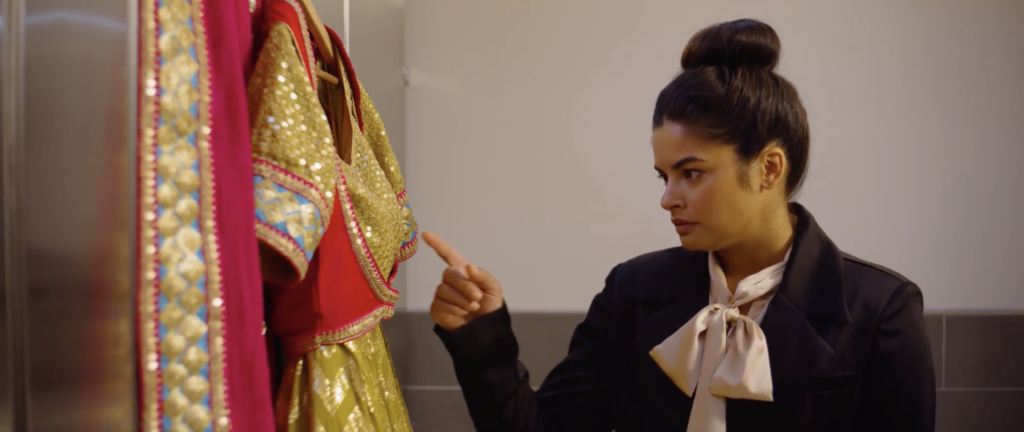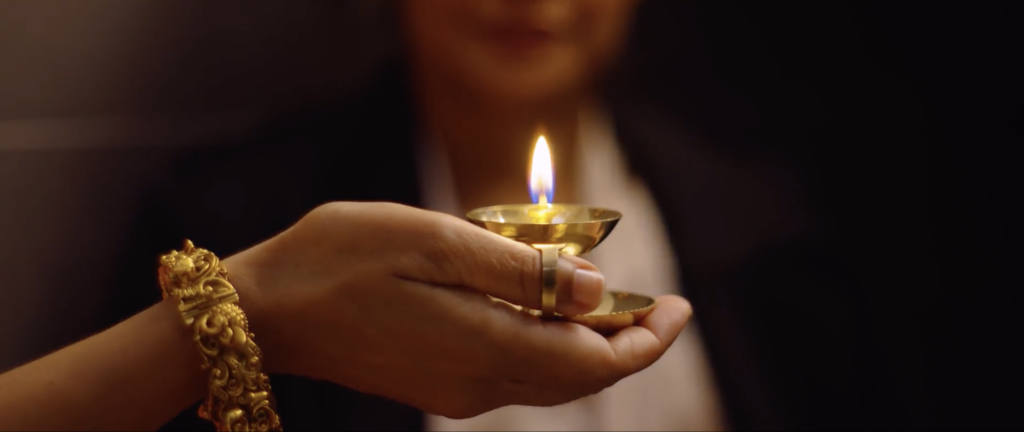Sirāt: No Lesson to Learn
The one-way journey went to the desert that refused to offer an answer or a transcendence.


From the get-go, we see the multilayered dilemma Mala faced in her workspace as a woman of color. The story began at her office cubicle. Besides the heavy workload, this delivery package from her parents contained a family expectation for her to continue desi traditions. Mala seemed to be mentally closed-off and have tunnel vision about finishing her work, rejecting her friend’s help or enjoying the party. In a passive-aggressive manner, her boss addressed her as a woman, therefore “bad at multitasking,” and dismissed Mala’s request for help simultaneously, showing the toxic working environment.
After she accidentally fell over, Mala had eye-to-eye contact with the miniature deity that was exposed from the box sent by her parents. She carefully picked up the statue and placed it on the table. This is my favorite part of the series. Without words, the close-ups of the statue and Mala’s facial expressions displayed an echo of traditions and memories that formed the respect. This small interaction went beyond the sanitized beige office and guided us to imagine the culture in her upbringing. This wasn’t the last time she fell in this series, nor was it the last time she made a reconnection with her past.

A lot of conversations between employees simply made my skin crawl. Mala’s colleagues threw the remarks about “ethnic decor,” “dancing exotically,” and the fusion between Chinese and Indian culture at her. This kind of casual racism, which often left people speechless in daily life, is condensed and showcased in this scene. When Mala’s friends were trying to educate the ignorant colleagues, she tried to deescalate and endure the situation. The tokenism nature of the Diwali party was pointed out by one of her colleagues: there were only two employees of Indian descent in the company, and the celebration of Diwali was solely for the diversity marks in media and without actual care. Not only was the word ‘tokenism’ named vocally, but its meaning and characters were also directly addressed in the series.
Mala continued to drink and dramatically fell on the ground. Like Dickens’s A Christmas Carol, she was visited by three female spirits from the past and future. When her comedically fell over and over, different diyas, the oil lamps, were lit again and again. We slowly get to know her backstory and inner thoughts. At first, her grandmother called out that the clothing people wore at the party was very off, like Halloween costumes, and that the workers were underpaid and overworked. The grandmother brought back the past memories of how she celebrated Diwali as a kid with the beautiful golden jewelry and the warmth of family. Later on, the college professors recalled Mala’s love for writing and her poetry reading in the classroom. It also highlights Mala’s sister’s cutting diet and the social expectations for women’s bodies. Lastly, her future self revealed her possible dull future. In this scene, the words ‘heavy duty’ were directly written outside the boxes in her cubicle. The spirits warned Mala: ‘What happened to the little girl?’; ‘Your future has not yet been set’; ‘This is not who you really are’; ‘You’re running out of time to face the truth.’ Alongside montages of the future, past, and present, Mala scrutinized and began to realize her current situation in life. The comedic elements kept shining a light during this process, as she knowingly made the connection with Dickens’s story and mumblingly wished for a simple godmother who made pretty dresses.

At the end, she put on the traditional clothing and quit the job, with a literal mic drop. Her previous rejection of the traditional clothing and sweets (Laddu) presented a constant struggle with her identity. She used to focus on assimilation and accumulation of wealth, trying to block out all the toxicity inside the company and her true feelings. At the same time, she also refused to showcase her culture as merely a decor to entertain her boss or colleagues. After she quit, her cultural identity wasn’t tangled with the numbing work environment anymore, and she finally embraced Diwali with love. This series neatly and lightheartedly presents the multiple issues that exist in daily life for a young woman and a person of color. The three female spirits embodied her inner conversation with herself, reconnecting with the past and present and reimagining the future. As Diwali is coming in 2025, this simple and clumsy yet heartfelt story encourages us to talk to ourselves more honestly, which I hope is without falling on the ground.
Related lists created by the same author
The one-way journey went to the desert that refused to offer an answer or a transcendence.
Related diversity category
Want a list to watch some of the best Japanese anime films of all time? Check out this article which presents some anime films that will keep you glued to your couch!
Related Movie / TV / List / Topic
Armed with a $400M budget and Tom Cruise’s death-defying stunts, Mission: Impossible – The Final Reckoning delivers pulse-pounding action even as its plot falters. From underwater silence to high-altitude madness, it's pure adrenaline powered by old-school movie magic — but is this really Ethan Hunt’s final mission?